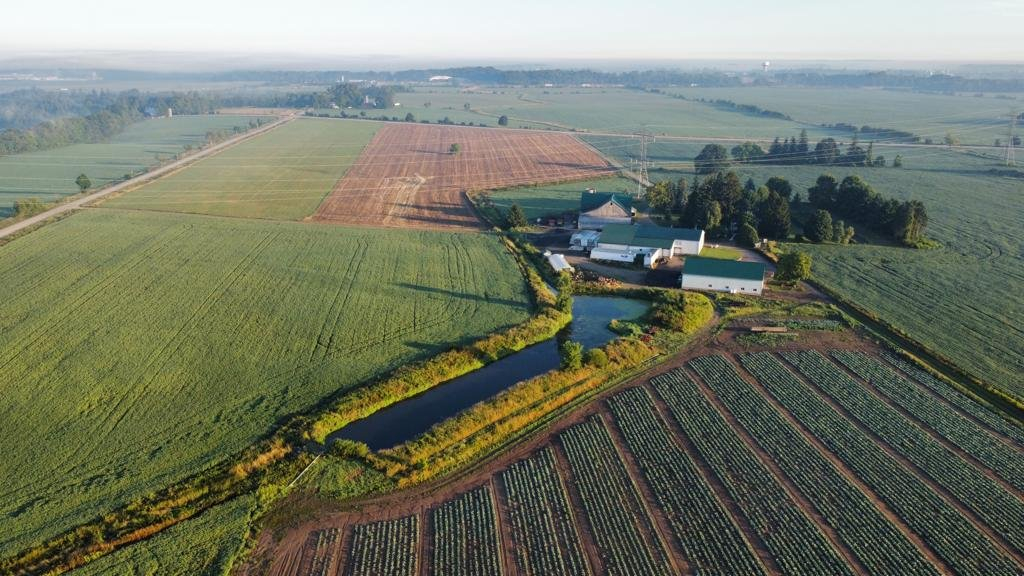In the quiet corner of a township, where farming families have tended the land for generations, a fierce fight is unfolding. These families, who have relied on their land to produce dairy, corn and wheat, now face a mysterious threat: a secret industrial project planned by the Region of Waterloo.
Landowners, farmers and advocates in Wilmot Township, about 120 kilometers northwest of Toronto, have launched an online petition that now has more more than 30,000 signatures. They demand the immediate cessation of the expropriation of 770 acres of farmland in the area, arguing that this “forced takeover” by the Region of Waterloo would severely impact Ontario’s food security, farmers’ livelihoods and the community’s environmental well-being.
“So far, everything is under wraps on this undisclosed project,” said Alfred Lowrick, who represents the affected property owners and concerned citizens of Wilmot Township. “We have one official plan for Waterloo Region which was confirmed in 2022 and is not mentioned about it. And even if it were, this is a big change and should be presented in a very formal and transparent way to the residents of the community so that they can have a say in it.”
Lowrick said last month that Canacre Ltd., which represents Waterloo Region, approached farmers and residents with unsigned contracts to buy the land at a low price. People were told they had more than a week to decide and sign, otherwise their land would be subject to expropriation by the region, he said.
“The worst thing is that all this was a surprise to all of us. There are no formal notifications, meetings and consultations.”
Canadian National Observer He contacted Mississauga-based Canacre Ltd. for a response but did not receive comment in time for publication.
“The reason for the secrecy is more economical because they (Waterloo Region) think they can buy this very cheap,” Lowrick said. “We are not against economic development, but we are very concerned about the lack of process…”
Lowrick said after Canacre Ltd. approached them, they immediately asked township staff for clarification, but were not provided any information due to confidentiality agreements. Afterwards, landowners and farmers had the opportunity to attend the Waterloo Region Council meeting. But they were only given three minutes to speak and received no answers to their questions because the councilors stated that they could not discuss the project. The same response was later given at the city council meeting.

in a presentation At the Wilmot Township Council meeting on March 25, Lowrick stated, “We are deeply concerned that this action by the Region of Waterloo is so inconsistent with many of its environmental, sustainability and climate change initiatives, as well as all the measures adopted in the long term”. term planning. The potential size, scale and location of this plant could jeopardize the environmental goals and commitments outlined in the region’s visionary “Rural Line” concept. It could also make it impossible to achieve essential greenhouse gas emissions reductions to meet federal, provincial and regional commitments under the Paris Agreement. , he added.
Farmers and their advocates argue that the Region of Waterloo’s “forced acquisition” of 770 acres of farmland in the area would severely impact Ontario’s food security, farmers’ livelihoods and the community’s environmental well-being. . #farmland
In response to a request for Canadian National Observer For comment, the Region of Waterloo sent a joint statement from the region and the municipality. “The Region of Waterloo and the Municipality of Wilmot are partnering in land preparation to create plug-and-play sites to attract economic investment and create jobs. “Land assembly is underway to create sites ready for large-scale economic investment to further support the economic vitality of Waterloo Region as it grows to one million people by 2050,” the statement reads. . “Recent engagement with over a hundred local and global companies highlighted that the availability of shovel-ready land was an important need when evaluating locations for future investment or expansion.”
In response to community members who contacted her office, Waterloo Regional President Karen Redman emphasized that the region and municipality remain committed to balancing protecting vital agricultural lands with ensuring significant economic investments to support a high quality of life for residents.
“While limited details can be shared at this time, further information and opportunities for engagement will be provided as soon as possible and all necessary consultations will take place,” Redman said in a statement shared with Canadian National Observer. “To ensure the privacy of the owners, we cannot speak specifically about the location or size of the area at this time.”
Redman highlighted that the objective is to ensure generational investments and create employment opportunities for the future.
Kevin Thomason, a local environmental advocate, said it is a huge industrial megasite. It is a planned development that has never had a single public meeting, study, investigation or protection effort made for it.
“For farmers, some of whom have been on the land for generations, being told to vacate their homes, businesses and livelihoods within 10 days is devastating,” Thomason said. “Not only is this some of the best agricultural land, it is also highly protected, chosen by farmers for its suitability for farming.”
In an online statementWilmot Township Mayor Natasha Salonen and council members said they will continue to advocate on behalf of landowners, ensuring the process is fair and equitable.
“As many know, the Region of Waterloo has been negotiating with some landowners in Wilmot about the sale of land. Those negotiations, like all real estate transactions, are conducted one-on-one. The municipality does not and should not participate directly in those subsequent discussions and transactions.” read the statement. “That said, we know there is considerable concern about the lack of information available in the public domain.”
